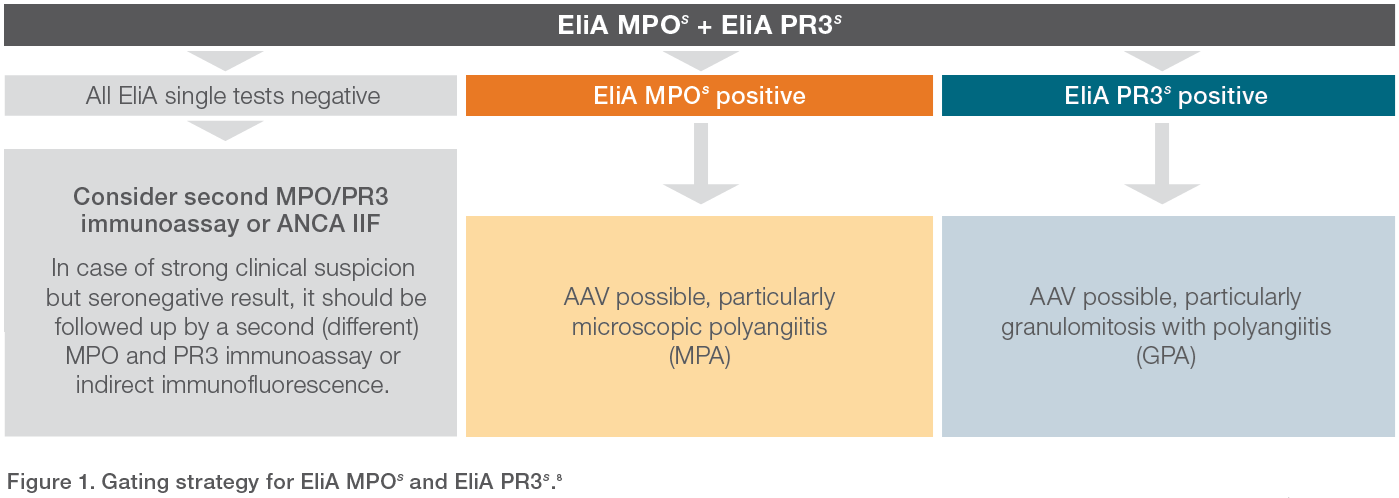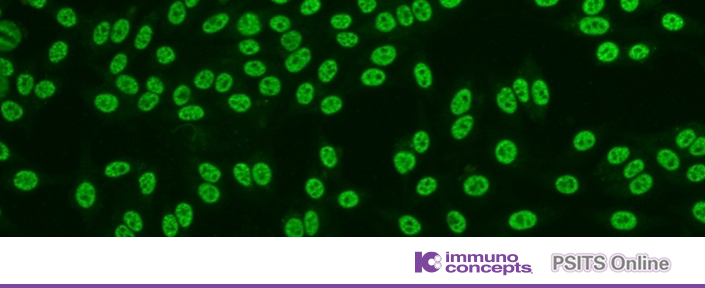ANCA-associated diseases are caused by vasculitis of the small vessels in which antineutrophil cytoplasmic antibodies (ANCA) can be detected in a patient’s blood.1,2 A rapid diagnosis of ANCA-associated small-vessel vasculitis is critically important because life-threatening injury to organs often develops quickly and can be rapidly mitigated by immunosuppressive therapy.2
The group of antineutrophil cytoplasmic autoantibody ANCA-associated vasculitides (AAVs) comprises microscopic polyangiitis (MPA), granulomatosis with polyangiitis (GPA), and eosinophilic granulomatosis with polyangiitis (EGPA).3
All of these diseases show features of vasculitis of the small vessels, but otherwise affect various different target organs with varying ANCA positivity.3 During the active stage of the disease, ANCAs against myeloperoxidase (MPO) and/or proteinase 3 (PR3) can be detected in MPA and GPA patients.2,3 Among patients with EGPA, less than 50% have ANCAs; the presence of ANCAs is associated with the typical manifestations of small vessel vasculitis, such as glomerulonephritis.1,3 Taking the concentrations of antibodies into account improves clinical interpretation.4 Literature suggests the potential to use ANCAs for the monitoring of relapse and remission states of already diagnosed patients.5,6
|
Advantages of routine testing with EliA PR3s and EliA MPOs:
|
|
View the Thermo Fisher Vasculitis Portfolio Brochure
References:
- Moiseev S, Bossuyt X, Arimura Y, Blockmans D, Csernok E, Damoiseaux J, et al. European EGPA Study Group. International Consensus on ANCA Testing in Eosinophilic Granulomatosis with Polyangiitis. Am J Respir Crit Care Med 2020 Jun.
- de Joode AA, Roozendaal C, van der Leij MJ, Bungener LB, Sanders JS, Stegeman CA. Performance of two strategies for urgent ANCA and anti-GBM analysis in vasculitis. Eur J Intern Med. 2014 Feb;25(2):182–186.
- Jennette JC, Falk RJ, Bacon PA, Basu N, Cid MC, Ferrario F, et al. 2012 revised International Chapel Hill Consensus Conference Nomenclature of Vasculitides. Arthritis Rheum. 2013 Jan;65(1):1–11.
- Damoiseaux J. ANCA Testing in Clinical Practice: From Implementation to Quality Control and Harmonization. Front Immunol. 2021 Mar;12:656796.
- Segelmark M, Phillips BD, Hogan SL, Falk RJ, Jennette JC. Monitoring proteinase 3 antineutrophil cytoplasmic antibodies for detection of relapses in small vessel vasculitis. Clin Diagn Lab Immunol. 2003 Sep;10(5):769–774.
- Han WK, Choi HK, Roth RM, McCluskey RT, Niles JL. Serial ANCA titers: useful tool for prevention of relapses in ANCA-associated vasculitis. Kidney Int. 2003 Mar;63(3):1079-8.
THESE PRODUCTS ARE NOT AVAILABLE FOR PURCHASE BY THE GENERAL PUBLIC.









